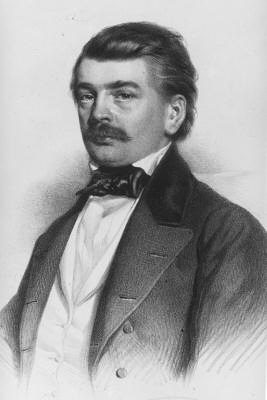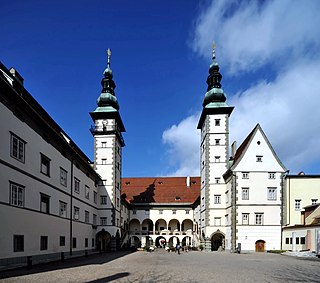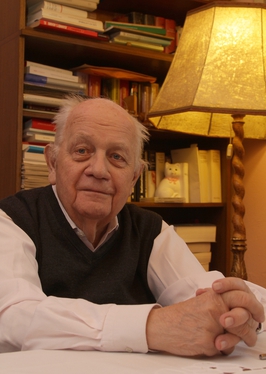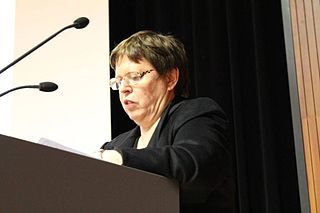Related Research Articles

Austrian German, Austrian Standard German (ASG), Standard Austrian German, or Austrian High German, or simply just Austrian, is the variety of Standard German written and spoken in Austria and South Tyrol. It has the highest sociolinguistic prestige locally, as it is the variation used in the media and for other formal situations. In less formal situations, Austrians use Bavarian and Alemannic dialects, which are traditionally spoken but rarely written in Austria.

Franz Miklosich was a Slovene philologist.

Carantania, also known as Carentania, was a Slavic principality that emerged in the second half of the 7th century, in the territory of present-day southern Austria and north-eastern Slovenia. It was the predecessor of the March of Carinthia, created within the Carolingian Empire in 889.

Klagenfurt am Wörthersee, usually known as simply Klagenfurt, is the capital of the state of Carinthia in Austria. With a population of 104,333, it is the sixth-largest city in the country. The city is the bishop's seat of the Roman Catholic Diocese of Gurk-Klagenfurt and home to the University of Klagenfurt, the Carinthian University of Applied Sciences and the Gustav Mahler University of Music.

Manfred Mayrhofer was an Austrian Indo-Europeanist who specialized in Indo-Iranian languages. Mayrhofer served as professor emeritus at the University of Vienna. He is noted for his etymological dictionary of Sanskrit.

Hemma of Gurk, also called Emma of Gurk, was a noblewoman and founder of several churches and monasteries in the Duchy of Carinthia. Buried at Gurk Cathedral since 1174, she was beatified on 21 November 1287 and canonised on 5 January 1938 by Pope Pius XI. Her feast day is 27 June. Hemma is venerated as a saint by both the Catholic Church and the Eastern Orthodox Church, and as patroness of the current Austrian state of Carinthia.
Carinthian Slovenes or Carinthian Slovenians are the indigenous minority of Slovene ethnicity, living within borders of the Austrian state of Carinthia, neighboring Slovenia. Their status of the minority group is guaranteed in principle by the Constitution of Austria and under international law, and have seats in the National Ethnic Groups Advisory Council.
Magdalensberg is a market town in the district of Klagenfurt-Land in Carinthia in Austria.
Poggersdorf is a municipality, since 2013 a so-called Market Municipality in the district of Klagenfurt-Land in the Austrian federal state of Carinthia.

The Slovene lands or Slovenian lands is the historical denomination for the territories in Central and Southern Europe where people primarily spoke Slovene. The Slovene lands were part of the Illyrian provinces, the Austrian Empire and Austria-Hungary. They encompassed Carniola, southern part of Carinthia, southern part of Styria, Istria, Gorizia and Gradisca, Trieste, and Prekmurje. Their territory more or less corresponds to modern Slovenia and the adjacent territories in Italy, Austria, Hungary, and Croatia, where autochthonous Slovene minorities live. In the areas where present-day Slovenia borders to neighboring countries, they were never homogeneously ethnically Slovene.

Tamara Griesser Pečar is a Slovenian historian.
The Österreichisches Wörterbuch, abbreviated ÖWB, is the official spelling dictionary of Standard German in the Republic of Austria, i.e. of Austrian Standard German. It is edited by a group of linguists under the authority of the Austrian Federal Ministry of Education, Arts and Culture and contains a number of terms unique to Austrian German or that are more frequently used or differently pronounced there. A considerable amount of this "Austrian" vocabulary is also common in Southern Germany, especially Bavaria, and some of it is used in Switzerland as well. The most recent edition is the 43rd from 2017. Since the 39th edition from 2001 the orthography of the ÖWB was adjusted to the German spelling reform of 1996. This dictionary is also in official use in the Italian province of South Tyrol.

Herbert Gantschacher is an Austrian director and producer and writer.

Wiener schnitzel, sometimes spelled Wienerschnitzel, is a type of schnitzel made of a thin, breaded, pan-fried veal cutlet.

The word Tauern is German and originally meant 'high mountain pass' in the Austrian Central Alps, referring to the many bridleways and passes of the parallel side valleys of the River Salzach that cut into the mountain ranges. From the Middle Ages, when mining reached its heyday, the word Tauern was also used to name the corresponding ranges. The name has survived in many local placenames today.
Kladivo was a Slovene and German language cultural-political magazine published from Klagenfurt, Austria, from 1970 to 1989.

The Lasörling is a mountain, 3,098 m (AA), and the highest summit in the eponymous range that stretches from the Virgental to the Defereggental valleys opposite the Großvenediger. Occasionally the mountain is also called the "Großer Lasörling" because it has a double summit - its southeast top reaching a height of 3,055 m above sea level (AA). The main top was formerly also called the Bergerspitze, and the southeast top the Musspitze or Virgen Lasörling.
The Hermagoras Society is Slovenia's oldest publishing house and has branches in Klagenfurt (Austria), Celje (Slovenia), and Gorizia (Italy). Named after Catholic Saint Hermagoras of Aquileia it originated on July 27, 1851 at the behest of Bishop Anton Martin Slomšek for the purpose of instructing Slovenes in reading and writing. Authorities formally recognized the organization in 1853 and in 1871 association opened its new building and publishing house. By 1918 the society had over 90,000 members and had published more than 16.3 million books. Following the results of the 1920 Carinthian plebiscite the seat was transferred from Klagenfurt to Celje. In 1940 during World War II both the Klagenfurt and Celje locations were closed down by the Nazis, who confiscated the printing presses and destroyed books.
The Rosen Valley Railway is a mainly Austrian railway that runs from Sankt Veit an der Glan via Klagenfurt and Rosenbach to Jesenice in Slovenia. The section between Rosenbach and Jesenice through the Karawanks Tunnel is part of and international long-distance route between Salzburg and Zagreb. The railway line is operated by the ÖBB. Traffic between Weizelsdorf and Rosenbach was suspended at the commencement 2016/17 timetable change. The line was sold to the state of Carinthia. NBIK heritage trains have been running between Weizelsdorf and Feistritz since the summer of 2020.

Katja Sturm-Schnabl is a Carinthian-Slovene linguist and literary historian known for her research and contemporary eyewitness accounts of the 20th century in central Europe.
References
- ↑ Heinz Dieter Pohl erhält Einspieler-Preis. University of Klagenfurt 10 November 2005. Accessed on 8 November 2020.
- ↑ Einspielerpreis, Kleine Zeitung, Klagenfurt 10 November 2005, p. 57.